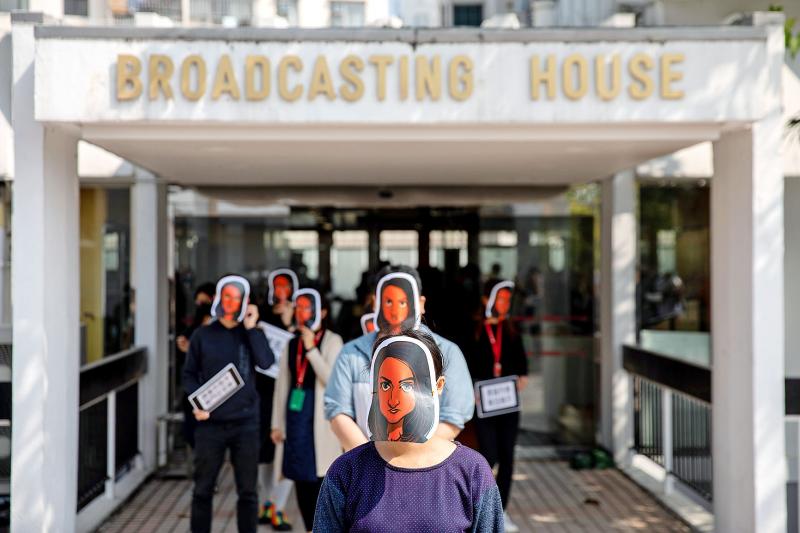The Hong Kong government’s review of Radio Television Hong Kong (RTHK) has found deficiencies in editorial management and a lack of transparency in handling complaints, signaling a major overhaul of the revered institution as concerns grow over media freedom.
The only independent, publicly funded media outlet on Chinese soil, RTHK was founded in 1928 and is sometimes compared with the BBC.
Its charter guarantees it editorial independence.

Photo: EPA-EFE
The broadcaster angered the Hong Kong government, the police and Beijing with its coverage of anti-government protests in 2019, including several investigations that sparked widespread criticism of the authorities.
“There are deficiencies in [the] editorial management mechanism,” the Hong Kong Commerce and Economic Development Bureau said in a 154-page report of its review released yesterday.
There were “no well-defined and properly documented editorial processes and decisions,” and no “clear allocation of roles and responsibilities among editorial staff,” it said. “Weak editorial accountability is observed.”
The government-led review focusing on aspects of RTHK’s governance and management was announced last year, spanning the issues of administration, financial control and personnel.
However, the union of the broadcaster’s staff said that the review “challenges the bottom line of logic.”
“Editorial autonomy has vanished into nothing,” it added.
Earlier yesterday, Hong Kong appointed Deputy Secretary for Home Affairs Patrick Li (李百全) as director of broadcasting, from March 1.
Li, a career bureaucrat who worked in the government’s constitutional and mainland affairs and security bureaus, but has no experience in media, is to replace veteran journalist Leung Ka-wing (梁家榮), six months before his contract expires.
Leung, whose management the review described as too “passive,” was not thanked for his service in the appointment notice, contrary to practice.
Beijing has said that patriots must run every public institution in Hong Kong.
The broadcaster “serves residents of the territory instead of bureaucrats,” its staff union said.
Pro-Beijing supporters regularly file complaints against RTHK and stage protests outside its headquarters, accusing it of anti-government bias.
Last week, RTHK said it was suspending the relay of BBC radio news after China barred the BBC World News service from its networks, highlighting how the territory’s media are falling under Beijing’s tightening sway.

MORE VISITORS: The Tourism Administration said that it is seeing positive prospects in its efforts to expand the tourism market in North America and Europe Taiwan has been ranked as the cheapest place in the world to travel to this year, based on a list recommended by NerdWallet. The San Francisco-based personal finance company said that Taiwan topped the list of 16 nations it chose for budget travelers because US tourists do not need visas and travelers can easily have a good meal for less than US$10. A bus ride in Taipei costs just under US$0.50, while subway rides start at US$0.60, the firm said, adding that public transportation in Taiwan is easy to navigate. The firm also called Taiwan a “food lover’s paradise,” citing inexpensive breakfast stalls

TRADE: A mandatory declaration of origin for manufactured goods bound for the US is to take effect on May 7 to block China from exploiting Taiwan’s trade channels All products manufactured in Taiwan and exported to the US must include a signed declaration of origin starting on May 7, the Bureau of Foreign Trade announced yesterday. US President Donald Trump on April 2 imposed a 32 percent tariff on imports from Taiwan, but one week later announced a 90-day pause on its implementation. However, a universal 10 percent tariff was immediately applied to most imports from around the world. On April 12, the Trump administration further exempted computers, smartphones and semiconductors from the new tariffs. In response, President William Lai’s (賴清德) administration has introduced a series of countermeasures to support affected

CROSS-STRAIT: The vast majority of Taiwanese support maintaining the ‘status quo,’ while concern is rising about Beijing’s influence operations More than eight out of 10 Taiwanese reject Beijing’s “one country, two systems” framework for cross-strait relations, according to a survey released by the Mainland Affairs Council (MAC) on Thursday. The MAC’s latest quarterly survey found that 84.4 percent of respondents opposed Beijing’s “one country, two systems” formula for handling cross-strait relations — a figure consistent with past polling. Over the past three years, opposition to the framework has remained high, ranging from a low of 83.6 percent in April 2023 to a peak of 89.6 percent in April last year. In the most recent poll, 82.5 percent also rejected China’s

PLUGGING HOLES: The amendments would bring the legislation in line with systems found in other countries such as Japan and the US, Legislator Chen Kuan-ting said Democratic Progressive Party (DPP) Legislator Chen Kuan-ting (陳冠廷) has proposed amending national security legislation amid a spate of espionage cases. Potential gaps in security vetting procedures for personnel with access to sensitive information prompted him to propose the amendments, which would introduce changes to Article 14 of the Classified National Security Information Protection Act (國家機密保護法), Chen said yesterday. The proposal, which aims to enhance interagency vetting procedures and reduce the risk of classified information leaks, would establish a comprehensive security clearance system in Taiwan, he said. The amendment would require character and loyalty checks for civil servants and intelligence personnel prior to